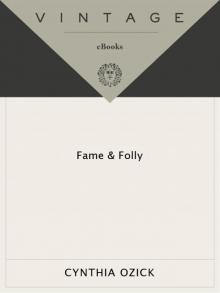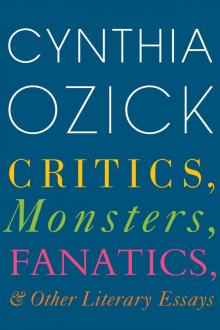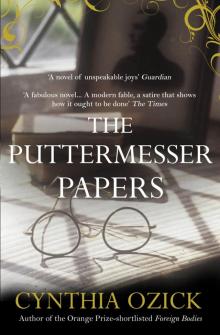- Home
- Cynthia Ozick
The Puttermesser Papers Page 2
The Puttermesser Papers Read online
Page 2
But Puttermesser discovered that in City life all rumors are true. Putative turncoats are genuine turncoats. All whispered knifings have happened: officials reputed to be about to topple, topple. So far Puttermesser had lasted through two elections, seeing the powerful become powerless and the formerly powerless inflate themselves overnight, like gigantic winds, to suck out the victory of the short run. When one Administration was razed, for the moment custom seemed leveled with it, everything that smelled of “before,” of “the old way”—but only at first. The early fits of innovation subsided, and gradually the old way of doing things crept back, covering everything over, like grass, as if the building and its workers were together some inexorable vegetable organism with its own laws of subsistence. The civil servants were grass. Nothing destroyed them, they were stronger than the pavement, they were stronger than time. The Administration might turn on its hinge, throwing out one lot of patronage eaters and gathering in the new lot: the work went on. They might put in fresh carpeting in the new Deputy’s office, or a private toilet in the new Commissioner’s, and change the clerks’ light bulbs to a lower wattage, and design an extravagant new colophon for a useless old document—they might do anything they liked: the work went on as before. The organism breathed, it comprehended itself.
So there was nothing for the Commissioner to do, and he knew it, and the organism knew it. For a very great salary the Commissioner shut his door and cleaned his nails behind it with one of the shining tools of a fancy Swiss knife, and had a secretary who was rude to everyone, and made dozens of telephone calls every day.
The current one was a rich and foolish playboy who had given the Mayor money for his campaign. All the high officials of every department were either men who had given the Mayor money or else courtiers who had humiliated themselves for him in the political clubhouse—mainly by flattering the clubhouse boss, who before any election was already a secret mayor and dictated the patronage lists. But the current Commissioner owed nothing to the boss because he had given the Mayor money and was the Mayor’s own appointee; and anyhow he would have little to do with the boss because he had little to do with any Italian. The boss was a gentlemanly Neapolitan named Fiore, the chairman of the board of a bank; still, he was only an Italian, and the Commissioner cared chiefly for blue-eyed bankers. He used his telephone to make luncheon appointments with them, and sometimes tennis. He himself was a blue-eyed Guggenheim, a German Jew, but not one of the grand philanthropic Guggenheims. The name was a cunning coincidence (cut down from Guggenheimer), and he was rich enough to be taken for one of the real Guggenheims, who thought him an upstart and disowned him. Grandeur demands discreetness; he was so discreetly disowned that no one knew it, not even the Rockefeller he had met at Choate.
This Commissioner was a handsome, timid man, still young, and good at boating; on weekends he wore sneakers and cultivated the friendship of the dynasties—Sulzbergers and Warburgs, who let him eat with them but warned their daughters against him. He had dropped out of two colleges and finally graduated from the third by getting a term-paper factory to plagiarize his reports. He was harmless and simpleminded, still devoted to his brainy late father, and frightened to death of news conferences. He understood nothing: art appreciation had been his best subject (he was attracted to Renaissance nudes), economics his worst. If someone asked, “How much does the City invest every day?” or “Is there any Constitutional bar against revenue from commuters?” or “What is your opinion about taxing exempt properties?” his pulse would catch in his throat, making his nose run, and he had to say he was pressed for time and would let them have the answers from his Deputy in charge of the Treasury. Sometimes he would even call on Puttermesser for an answer.
Now if this were an optimistic portrait, exactly here is where Puttermesser’s emotional life would begin to grind itself into evidence. Her biography would proceed romantically, the rich young Commissioner of the Department of Receipts and Disbursements would fall in love with her. She would convert him to intelligence and to the cause of Soviet Jewry. He would abandon boating and the pursuit of bluebloods. Puttermesser would end her work history abruptly and move on to a bower in a fine suburb.
This is not to be. Puttermesser will always be an employee in the Municipal Building. She will always behold Brooklyn Bridge through its windows; also sunsets of high glory, bringing her religious pangs. She will not marry. Perhaps she will undertake a long-term affair with Vogel, the Deputy in charge of the Treasury; perhaps not.
The difficulty with Puttermesser is that she is loyal to certain environments.
Puttermesser, while working in the Municipal Building, had a luxuriant dream, a dream of gan eydn—a term and notion handed on from her great-uncle Zindel, a former shammes in a shul that had been torn down. In this reconstituted Garden of Eden, which is to say in the World to Come, Puttermesser, who was not afflicted with quotidian uncertainty in the Present World, had even more certainty of her aims. With her weakness for fudge (others of her age, class, and character had advanced to martinis, at least to ginger ale; Puttermesser still drank ice cream with cola, despised mints as too tingly, eschewed salty liver canapés, hunted down chocolate babies, Kraft caramels, Mary Janes, Milky Ways, peanut brittle, and immediately afterward furiously brushed her teeth, scrubbing off guilt)—with all this nasty self-indulgence, she was nevertheless very thin and unironic. Or: to postulate an afterlife was her single irony—a game in the head not unlike a melting fudge cube held against the upper palate.
There, at any rate, Puttermesser would sit, in Eden, under a middle-sized tree, in the solid blaze of an infinite heart-of-summer July, green, green, green everywhere, green above and green below, herself gleaming and made glorious by sweat, every itch annihilated, fecundity dismissed. And there Puttermesser would, as she imagined it, take in. Ready to her left hand, the box of fudge (rather like the fudge sold to the lower school by the eighth-grade cooking class in P.S. 74, The Bronx, circa 1942); ready to her right hand, a borrowed steeple of library books: for into Eden the Crotona Park Branch has ascended intact, sans librarians and fines, but with its delectable terrestrial binding-glue fragrances unevaporated.
Here Puttermesser sits. Day after celestial day, perfection of desire upon perfection of contemplation, into the exaltations of an uninterrupted forever, she eats fudge in human shape (once known—no use covering this up—as nigger babies), or fudge in square shapes (and in Eden there is no tooth decay); and she reads. Puttermesser reads and reads. Her eyes in Paradise are unfatigued. And if she still does not know what it is she wants to solve, she has only to read on. The Crotona Park Branch is as paradisal here as it was on earth. She reads anthropology, zoology, physical chemistry, philosophy (in the green air of heaven, Kant and Nietzsche together fall into crystal splinters). The New Books section is peerless: she will learn about the linkages of genes, about quarks, about primate sign language, theories of the origins of the races, religions of ancient civilizations, what Stonehenge meant. Puttermesser will read Non-Fiction into eternity; and there is still time for Fiction! Eden is equipped above all with timelessness, so Puttermesser will read at last all of Balzac, all of Dickens, all of Turgenev and Dostoevsky (her mortal self has already read all of Tolstoy and George Eliot); at last Puttermesser will read Kristin Lavransdatter and the stupendous trilogy of Dmitri Merezhkovsky, she will read The Magic Mountain and the whole Faerie Queene and every line of The Ring and the Book, she will read a biography of Beatrix Potter and one of Walter Scott in many entrancing volumes and one of Lytton Strachey, at last, at last! In Eden insatiable Puttermesser will be nourished, if not glutted. She will study Roman law, the more arcane varieties of higher mathematics, the nuclear composition of the stars, what happened to the Monophysites, Chinese history, Russian, and Icelandic.
But meanwhile, still alive, not yet translated upward, her days given over to the shadow reign of a playboy Commissioner, Puttermesser was learning only Hebrew.
Twice a week, at night (it seeme
d), she went to Uncle Zindel for a lesson. Where the bus ran through peeling neighborhoods the trolley tracks sometimes shone up through a broken smother of asphalt, like weeds wanting renewal. From childhood Puttermesser remembered how trolley days were better days: in summer the cars banged along, self-contained little carnivals, with open wire-mesh sides sucking in hot winds, the passengers serenely jogging on the seats. Not so this bus, closed like a capsule against the slum.
The old man, Zindel the Stingy, hung on to life among the cooking smells of Spanish-speaking blacks. Puttermesser walked up three flights of steps and leaned against the crooked door, waiting for the former shammes with his little sack. Each evening Zindel brought up a single egg from the Cuban grocery. He boiled it while Puttermesser sat with her primer.
“You should go downtown,” the shammes said, “where they got regular language factories. Berlitz. NYU. They even got an ulpan, like in Israel.”
“You’re good enough,” Puttermesser said. “You know everything they know.”
“And something more also. Why you don’t live downtown, on the East Side, fancy?”
“The rent is too much, I inherited your stinginess.”
“And such a name. A nice young fellow meets such a name, he laughs. You should change it to something different, lovely, nice. Shapiro, Levine. Cohen, Goldweiss, Blumenthal. I don’t say make it different, who needs Adams, who needs McKee, I say make it a name not a joke. Your father gave you a bad present with it. For a young girl, Butterknife!”
“I’ll change it to Margarine-messer.”
“Never mind the ha-ha. My father, what was your great-great-grandfather, didn’t allow a knife to the table Friday night. When it came to kiddush—knifes off! All knifes! On Sabbath an instrument, a blade? On Sabbath a weapon? A point? An edge? What makes bleeding among mankind? What makes war? Knifes! No knifes! Off! A clean table! And something else you’ll notice. By us we got only messer, you follow? By them they got sword, they got lance, they got halberd. Go to the dictionary, I went once. So help me, what don’t one of them knights carry? Look up in the book, you’ll see halberd, you’ll see cutlass, pike, rapier, foil, ten dozen more. By us a pike is a fish. Not to mention what nowadays they got—bayonet stuck on the gun, who knows what else the poor soldier got to carry in the pocket. Maybe a dagger same as a pirate. But by us—what we got? A messer! Puttermesser, you slice off a piece butter, you cut to live, not to kill. A name of honor, you follow? Still, for a young girl—”
“Uncle Zindel, I’m past thirty.”
Uncle Zindel blinked lids like insect’s wings, translucent. He saw her voyaging, voyaging. The wings of his eyes shadowed the Galilee. They moved over the Tomb of the Patriarchs. A tear for the tears of Mother Rachel rode on his nose. “Your mother knows you’re going? Alone on an airplane, such a young girl? You wrote her?”
“I wrote her, Uncle Zindel. I’m not flying anywhere.”
“By sea is also danger. What Mama figures, in Miami who is there? The dead and dying. In Israel you’ll meet someone. You’ll marry, you’ll settle there. What’s the difference, these days, modern times, quick travel—”
Uncle Zindel’s egg was ready, hard-boiled. The shammes tapped it and the shell came off raggedly. Puttermesser consulted the alphabet: aleph, beys, gimel; she was not going to Israel, she had business in the Municipal Building. Uncle Zindel, chewing, began finally to teach: “First see how a gimel and which way a zayen. Twins, but one kicks a leg left, one right. You got to practice the difference. If legs don’t work, think pregnant bellies. Mrs. Zayen pregnant in one direction, Mrs. Gimel in the other. Together they give birth to gez, which means what you cut off. A night for knifes! Listen, going home from here you should be extra careful tonight. Martinez, the upstairs not the next door, her daughter they mugged and they took.”
The shammes chewed, and under his jaws Puttermesser’s head bent, practicing the bellies of the holy letters.
Stop. Stop, stop! Puttermesser’s biographer, stop! Disengage, please. Though it is true that biographies are invented, not recorded, here you invent too much. A symbol is allowed, but not a whole scene: do not accommodate too obsequiously to Puttermesser’s romance. Having not much imagination, she is literal with what she has. Uncle Zindel lies under the earth of Staten Island. Puttermesser has never had a conversation with him; he died four years before her birth. He is all legend: Zindel the Stingy, who even in gan eydn rather than eat will store apples until they rot. Zindel the Unripe. Why must Puttermesser fall into so poignant a fever over the cracked phrases of a shammes of a torn-down shul?
(The shul was not torn down, neither was it abandoned. It disintegrated. Crumb by crumb it vanished. Stones took some of the windows. There were no pews, only wooden folding chairs. Little by little these turned into sticks. The prayer books began to flake: the bindings flaked, the glue came unstuck in small brown flakes, the leaves grew brittle and flaked into confetti. The congregation too began to flake off—the women first, wife after wife after wife, each one a pearl and a consolation, until there they stand, the widowers, frail, gazing, palsy-struck. Alone and in terror. Golden Agers, Senior Citizens! And finally they too flake away, the shammes among them. The shul becomes a wisp, a straw, a feather, a hair.)
But Puttermesser must claim an ancestor. She demands connection—surely a Jew must own a past. Poor Puttermesser has found herself in the world without a past. Her mother was born into the din of Madison Street and was taken up to the hullabaloo of Harlem at an early age. Her father is nearly a Yankee: his father gave up peddling to captain a dry-goods store in Providence, Rhode Island. In summer he sold captain’s hats, and wore one in all his photographs. Of the world that was, there is only this single grain of memory: that once an old man, Puttermesser’s mother’s uncle, kept his pants up with a rope belt, was called Zindel, lived without a wife, ate frugally, knew the holy letters, died with thorny English a wilderness between his gums. To him Puttermesser clings. America is a blank, and Uncle Zindel is all her ancestry. Unironic, unimaginative, her plain but stringent mind strains beyond the parents—what did they have? Only day-by-day in their lives, coffee in the morning, washing underwear, occasionally a trip to the beach. Blank. What did they know? Everything from the movies; something—scraps—from the newspaper. Blank.
Behind the parents, beyond and before them, things teem. In old photographs of the Jewish East Side, Puttermesser sees the teeming. She sees a long coat. She sees a woman pressing onions from a pushcart. She sees a tiny child with a finger in its mouth who will become a judge.
Past the judge, beyond and behind him, something more is teeming. But this Puttermesser cannot see. The towns, the little towns. Zindel born into a flat-roofed house a modest distance from a stream.
What can Puttermesser do? She began life as the child of an anti-Semite. Her father would not eat kosher meat—it was, he said, too tough. He had no superstitions. He wore the mother down, she went to the regular meat market at last.
The scene with Uncle Zindel did not occur. How Puttermesser loved the voice of Zindel in the scene that did not occur!
(He is under the ground. The cemetery is a teeming city of toy skyscrapers shouldering each other. Born into a wooden house, Zindel now has a flat stone roof. Who buried him? Strangers from the landsmanshaft society. Who said a word for him? No one. Who remembers him now?)
Puttermesser does not remember Uncle Zindel; Puttermesser’s mother does not remember him. A name in the dead grandmother’s mouth. Her parents have no ancestry. Therefore Puttermesser rejoices in the cadences of Uncle Zindel’s voice above the Cuban grocery. Uncle Zindel, when alive, distrusted the building of Tel Aviv because he was practical, Messiah was not imminent. But now, in the scene that did not occur, how naturally he supposes Puttermesser will journey to a sliver of earth in the Middle East, surrounded by knives, missiles, bazookas!
The scene with Uncle Zindel did not occur. It could not occur because, though Puttermesser dares to posit her ancestry, we may not. P
uttermesser is not to be examined as an artifact but as an essence. Who made her? No one cares. Puttermesser is henceforth to be presented as given. Put her back into Receipts and Disbursements, among office Jews and patronage collectors. While winter dusk blackens the Brooklyn Bridge, let us hear her opinion about the taxation of exempt properties. The bridge is not the harp Hart Crane said it was in his poem. Its staves are prison bars. The women clerks, Yefimova, Korolova, Akulova, Arkhipova, Izrailova, are on Kolpachni Street, but the vainglorious General Viryein is not. He is on Ogaryova Street. Joel Zaretsky’s ex-wife is barren. The Commissioner puts on his tennis sneakers. He telephones. Mr. Fiore, the courtly secret mayor behind the Mayor, also telephones. Hey! Puttermesser’s biographer! What will you do with her now?
PUTTERMESSER AND XANTHIPPE
I. PUTTERMESSER’S BRIEF LOVE LIFE, HER TROUBLES, HER TITLES
PUTTERMESSER FELT ATTACKED ON all sides. The night before, her lover, Morris Rappoport, a married fund-raiser from Toronto, had walked out on her. His mysterious job included settling Soviet Jewish refugees away from the big metropolitan centers; he claimed to have fresh news of the oppressed everywhere, as well as intimate acquaintance with malcontents in numerous cities in both the Eastern and Western hemispheres. Puttermesser, already forty-six, suspected him of instability and overdependency: a future madman. His gripe was that she read in bed too much; last night she had read aloud from Plato’s Theaetetus:
THEODORUS: What do you mean, Socrates?
SOCRATES: The same thing as the story about the Thracian maidservant who exercised her wit at the expense of Thales, when he was looking up to study the stars and tumbled down a well. She scoffed at him for being so eager to know what was happening in the sky that he could not see what lay at his feet. Anyone who gives his life to philosophy is open to such mockery. It is true that he is unaware what his next-door neighbor is doing, hardly knows, indeed, whether the creature is a man at all; he spends all his pains on the question, what man is, and what powers and properties distinguish such a nature from any other. You see what I mean, Theodorus?

 Antiquities
Antiquities Fame & Folly
Fame & Folly The Messiah of Stockholm
The Messiah of Stockholm Critics, Monsters, Fanatics, and Other Literary Essays
Critics, Monsters, Fanatics, and Other Literary Essays Heir to the Glimmering World
Heir to the Glimmering World The Din in the Head
The Din in the Head Dictation
Dictation The Puttermesser Papers
The Puttermesser Papers Metaphor and Memory
Metaphor and Memory Art and Ardor
Art and Ardor Foreign Bodies
Foreign Bodies Quarrel & Quandary
Quarrel & Quandary